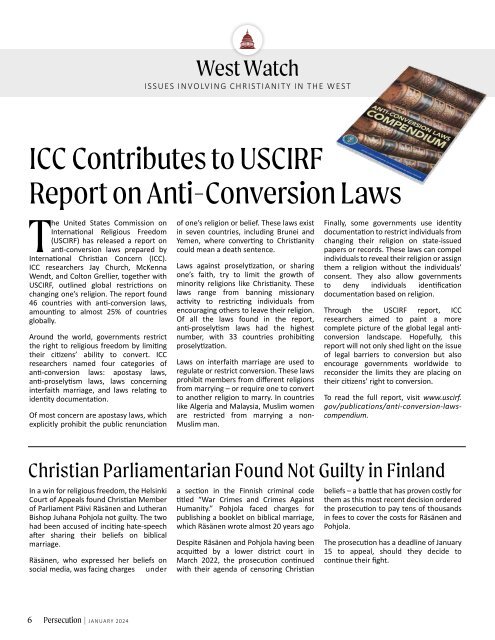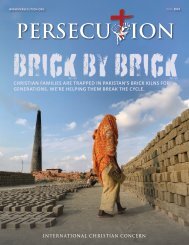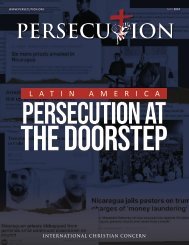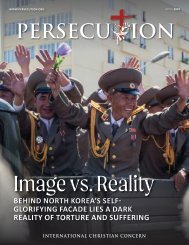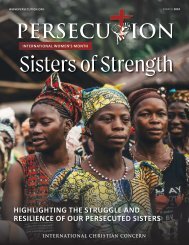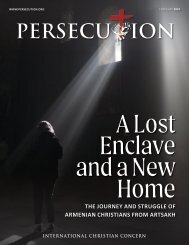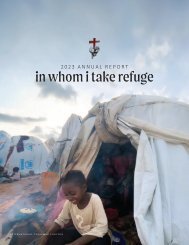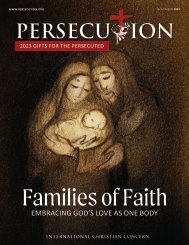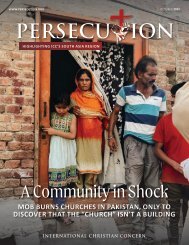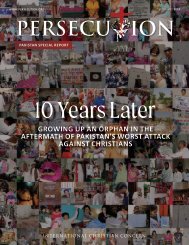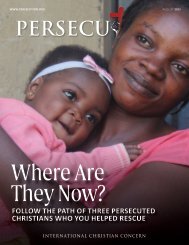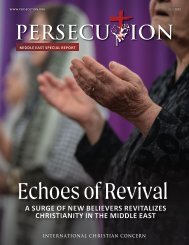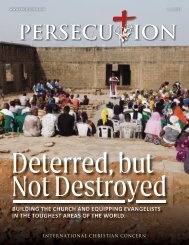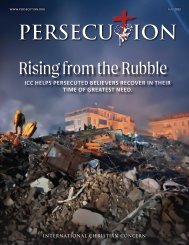January 2024 Persecution Magazine
Create successful ePaper yourself
Turn your PDF publications into a flip-book with our unique Google optimized e-Paper software.
West Watch<br />
ISSUES INVOLVING CHRISTIANITY IN THE WEST<br />
ICC Contributes to USCIRF<br />
Report on Anti-Conversion Laws<br />
The United States Commission on<br />
International Religious Freedom<br />
(USCIRF) has released a report on<br />
anti-conversion laws prepared by<br />
International Christian Concern (ICC).<br />
ICC researchers Jay Church, McKenna<br />
Wendt, and Colton Grellier, together with<br />
USCIRF, outlined global restrictions on<br />
changing one’s religion. The report found<br />
46 countries with anti-conversion laws,<br />
amounting to almost 25% of countries<br />
globally.<br />
Around the world, governments restrict<br />
the right to religious freedom by limiting<br />
their citizens’ ability to convert. ICC<br />
researchers named four categories of<br />
anti-conversion laws: apostasy laws,<br />
anti-proselytism laws, laws concerning<br />
interfaith marriage, and laws relating to<br />
identity documentation.<br />
Of most concern are apostasy laws, which<br />
explicitly prohibit the public renunciation<br />
of one’s religion or belief. These laws exist<br />
in seven countries, including Brunei and<br />
Yemen, where converting to Christianity<br />
could mean a death sentence.<br />
Laws against proselytization, or sharing<br />
one’s faith, try to limit the growth of<br />
minority religions like Christianity. These<br />
laws range from banning missionary<br />
activity to restricting individuals from<br />
encouraging others to leave their religion.<br />
Of all the laws found in the report,<br />
anti-proselytism laws had the highest<br />
number, with 33 countries prohibiting<br />
proselytization.<br />
Laws on interfaith marriage are used to<br />
regulate or restrict conversion. These laws<br />
prohibit members from different religions<br />
from marrying – or require one to convert<br />
to another religion to marry. In countries<br />
like Algeria and Malaysia, Muslim women<br />
are restricted from marrying a non-<br />
Muslim man.<br />
Finally, some governments use identity<br />
documentation to restrict individuals from<br />
changing their religion on state-issued<br />
papers or records. These laws can compel<br />
individuals to reveal their religion or assign<br />
them a religion without the individuals’<br />
consent. They also allow governments<br />
to deny individuals identification<br />
documentation based on religion.<br />
Through the USCIRF report, ICC<br />
researchers aimed to paint a more<br />
complete picture of the global legal anticonversion<br />
landscape. Hopefully, this<br />
report will not only shed light on the issue<br />
of legal barriers to conversion but also<br />
encourage governments worldwide to<br />
reconsider the limits they are placing on<br />
their citizens’ right to conversion.<br />
To read the full report, visit www.uscirf.<br />
gov/publications/anti-conversion-lawscompendium.<br />
Christian Parliamentarian Found Not Guilty in Finland<br />
In a win for religious freedom, the Helsinki<br />
Court of Appeals found Christian Member<br />
of Parliament Päivi Räsänen and Lutheran<br />
Bishop Juhana Pohjola not guilty. The two<br />
had been accused of inciting hate-speech<br />
after sharing their beliefs on biblical<br />
marriage.<br />
Räsänen, who expressed her beliefs on<br />
social media, was facing charges under<br />
a section in the Finnish criminal code<br />
titled “War Crimes and Crimes Against<br />
Humanity.” Pohjola faced charges for<br />
publishing a booklet on biblical marriage,<br />
which Räsänen wrote almost 20 years ago<br />
Despite Räsänen and Pohjola having been<br />
acquitted by a lower district court in<br />
March 2022, the prosecution continued<br />
with their agenda of censoring Christian<br />
beliefs – a battle that has proven costly for<br />
them as this most recent decision ordered<br />
the prosecution to pay tens of thousands<br />
in fees to cover the costs for Räsänen and<br />
Pohjola.<br />
The prosecution has a deadline of <strong>January</strong><br />
15 to appeal, should they decide to<br />
continue their fight.<br />
6<br />
<strong>Persecution</strong> | JANUARY <strong>2024</strong>


